Corporate Responsibility and Social Governance: OECD Country Analysis
VerifiedAdded on 2020/02/18
|9
|1994
|36
Essay
AI Summary
This essay analyzes a case study of an OECD country striving to reduce oil and gas imports by developing biofuels, which necessitates land acquisition from small-scale farmers. The analysis examines the situation through capitalist and socialist lenses. The capitalist view emphasizes economic growth, job creation, and the country's global standing, advocating for government facilitation and taxation to compensate displaced farmers. It highlights the benefits of fossil fuel production and the importance of a free market. The socialist view prioritizes social justice and environmental protection, criticizing the displacement of farmers and the potential for increased inequality. It stresses the importance of community involvement, fair compensation, and sustainable practices. The essay references various sources to support both perspectives, discussing the impact of corporate responsibility and social governance on the country's economic and social landscape.
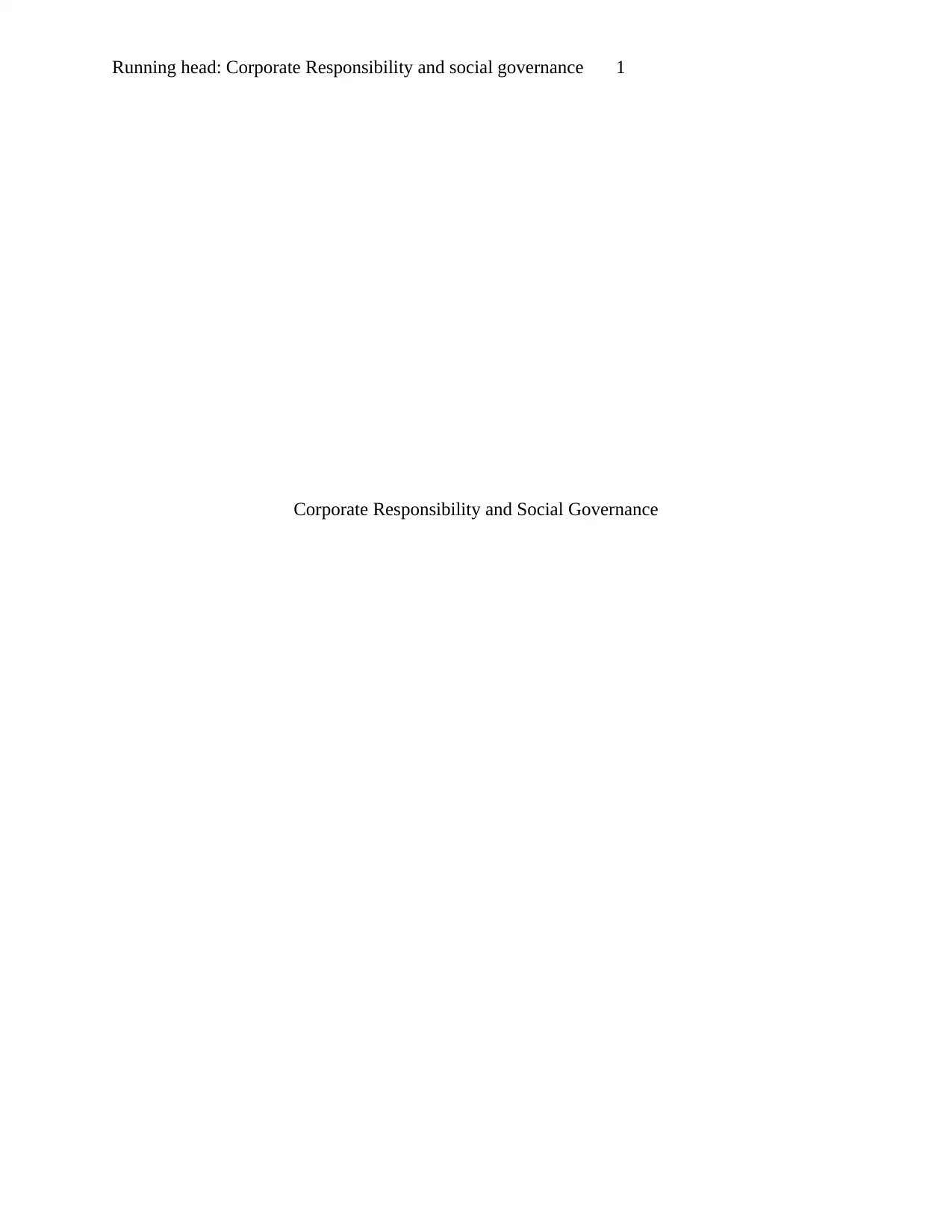
Running head: Corporate Responsibility and social governance 1
Corporate Responsibility and Social Governance
Corporate Responsibility and Social Governance
Paraphrase This Document
Need a fresh take? Get an instant paraphrase of this document with our AI Paraphraser
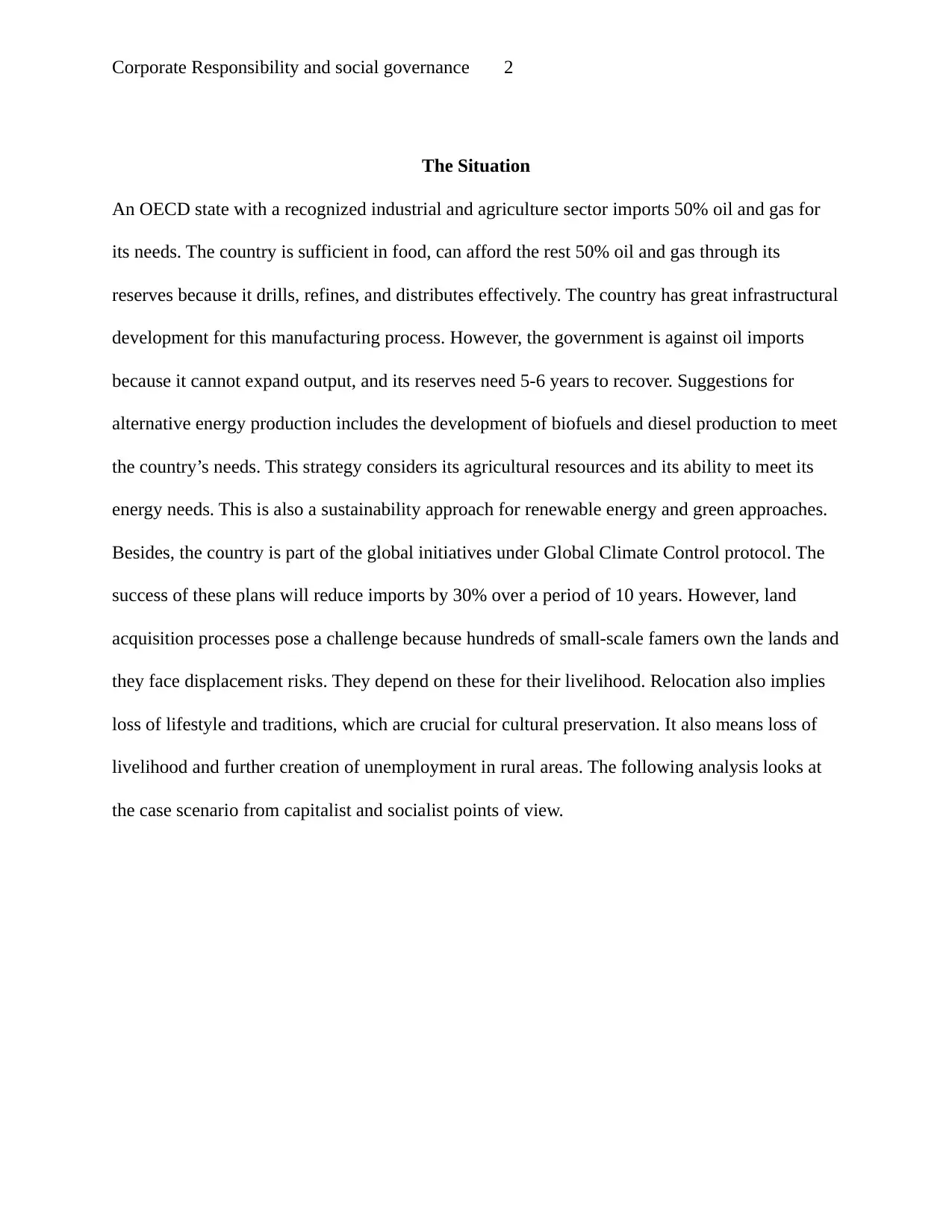
Corporate Responsibility and social governance 2
The Situation
An OECD state with a recognized industrial and agriculture sector imports 50% oil and gas for
its needs. The country is sufficient in food, can afford the rest 50% oil and gas through its
reserves because it drills, refines, and distributes effectively. The country has great infrastructural
development for this manufacturing process. However, the government is against oil imports
because it cannot expand output, and its reserves need 5-6 years to recover. Suggestions for
alternative energy production includes the development of biofuels and diesel production to meet
the country’s needs. This strategy considers its agricultural resources and its ability to meet its
energy needs. This is also a sustainability approach for renewable energy and green approaches.
Besides, the country is part of the global initiatives under Global Climate Control protocol. The
success of these plans will reduce imports by 30% over a period of 10 years. However, land
acquisition processes pose a challenge because hundreds of small-scale famers own the lands and
they face displacement risks. They depend on these for their livelihood. Relocation also implies
loss of lifestyle and traditions, which are crucial for cultural preservation. It also means loss of
livelihood and further creation of unemployment in rural areas. The following analysis looks at
the case scenario from capitalist and socialist points of view.
The Situation
An OECD state with a recognized industrial and agriculture sector imports 50% oil and gas for
its needs. The country is sufficient in food, can afford the rest 50% oil and gas through its
reserves because it drills, refines, and distributes effectively. The country has great infrastructural
development for this manufacturing process. However, the government is against oil imports
because it cannot expand output, and its reserves need 5-6 years to recover. Suggestions for
alternative energy production includes the development of biofuels and diesel production to meet
the country’s needs. This strategy considers its agricultural resources and its ability to meet its
energy needs. This is also a sustainability approach for renewable energy and green approaches.
Besides, the country is part of the global initiatives under Global Climate Control protocol. The
success of these plans will reduce imports by 30% over a period of 10 years. However, land
acquisition processes pose a challenge because hundreds of small-scale famers own the lands and
they face displacement risks. They depend on these for their livelihood. Relocation also implies
loss of lifestyle and traditions, which are crucial for cultural preservation. It also means loss of
livelihood and further creation of unemployment in rural areas. The following analysis looks at
the case scenario from capitalist and socialist points of view.
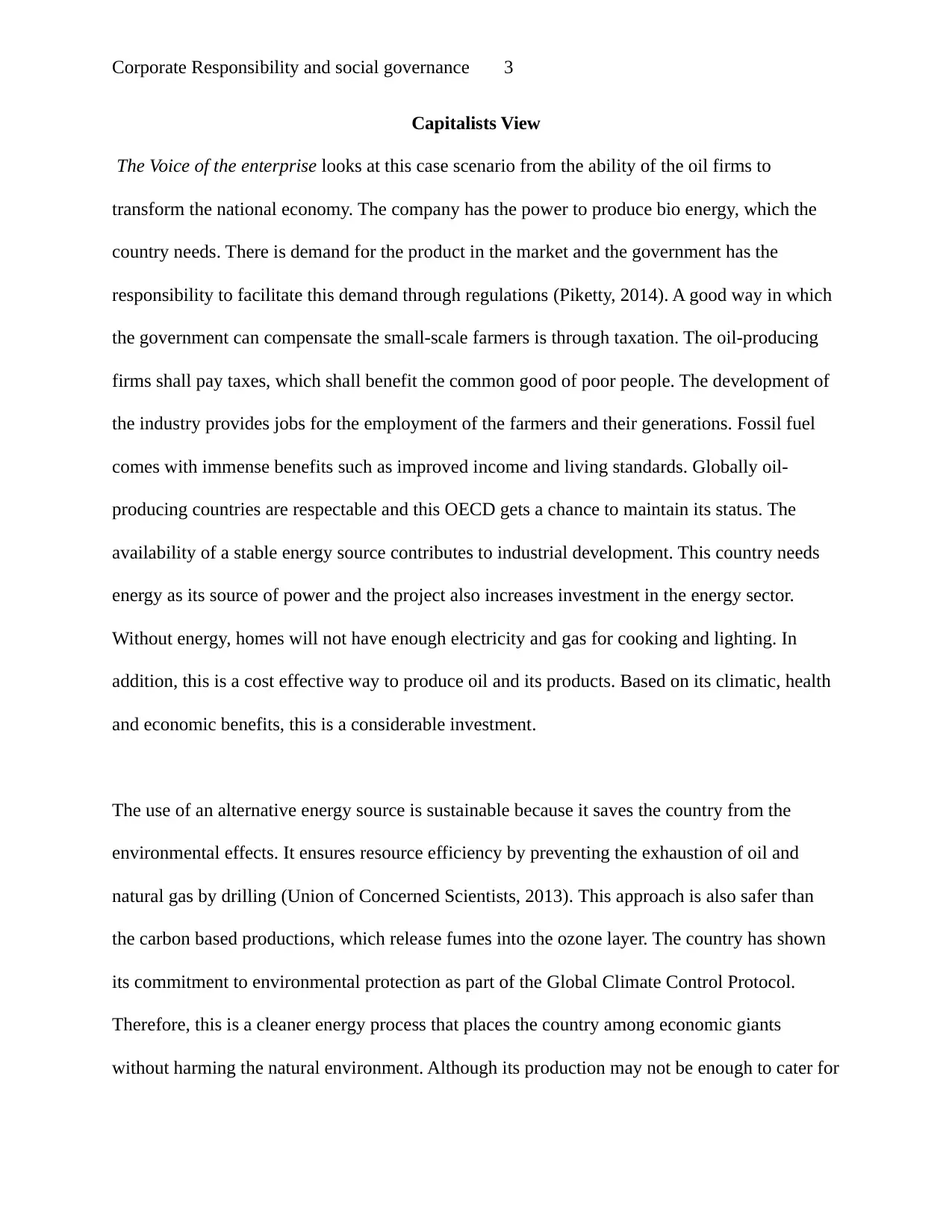
Corporate Responsibility and social governance 3
Capitalists View
The Voice of the enterprise looks at this case scenario from the ability of the oil firms to
transform the national economy. The company has the power to produce bio energy, which the
country needs. There is demand for the product in the market and the government has the
responsibility to facilitate this demand through regulations (Piketty, 2014). A good way in which
the government can compensate the small-scale farmers is through taxation. The oil-producing
firms shall pay taxes, which shall benefit the common good of poor people. The development of
the industry provides jobs for the employment of the farmers and their generations. Fossil fuel
comes with immense benefits such as improved income and living standards. Globally oil-
producing countries are respectable and this OECD gets a chance to maintain its status. The
availability of a stable energy source contributes to industrial development. This country needs
energy as its source of power and the project also increases investment in the energy sector.
Without energy, homes will not have enough electricity and gas for cooking and lighting. In
addition, this is a cost effective way to produce oil and its products. Based on its climatic, health
and economic benefits, this is a considerable investment.
The use of an alternative energy source is sustainable because it saves the country from the
environmental effects. It ensures resource efficiency by preventing the exhaustion of oil and
natural gas by drilling (Union of Concerned Scientists, 2013). This approach is also safer than
the carbon based productions, which release fumes into the ozone layer. The country has shown
its commitment to environmental protection as part of the Global Climate Control Protocol.
Therefore, this is a cleaner energy process that places the country among economic giants
without harming the natural environment. Although its production may not be enough to cater for
Capitalists View
The Voice of the enterprise looks at this case scenario from the ability of the oil firms to
transform the national economy. The company has the power to produce bio energy, which the
country needs. There is demand for the product in the market and the government has the
responsibility to facilitate this demand through regulations (Piketty, 2014). A good way in which
the government can compensate the small-scale farmers is through taxation. The oil-producing
firms shall pay taxes, which shall benefit the common good of poor people. The development of
the industry provides jobs for the employment of the farmers and their generations. Fossil fuel
comes with immense benefits such as improved income and living standards. Globally oil-
producing countries are respectable and this OECD gets a chance to maintain its status. The
availability of a stable energy source contributes to industrial development. This country needs
energy as its source of power and the project also increases investment in the energy sector.
Without energy, homes will not have enough electricity and gas for cooking and lighting. In
addition, this is a cost effective way to produce oil and its products. Based on its climatic, health
and economic benefits, this is a considerable investment.
The use of an alternative energy source is sustainable because it saves the country from the
environmental effects. It ensures resource efficiency by preventing the exhaustion of oil and
natural gas by drilling (Union of Concerned Scientists, 2013). This approach is also safer than
the carbon based productions, which release fumes into the ozone layer. The country has shown
its commitment to environmental protection as part of the Global Climate Control Protocol.
Therefore, this is a cleaner energy process that places the country among economic giants
without harming the natural environment. Although its production may not be enough to cater for
⊘ This is a preview!⊘
Do you want full access?
Subscribe today to unlock all pages.

Trusted by 1+ million students worldwide
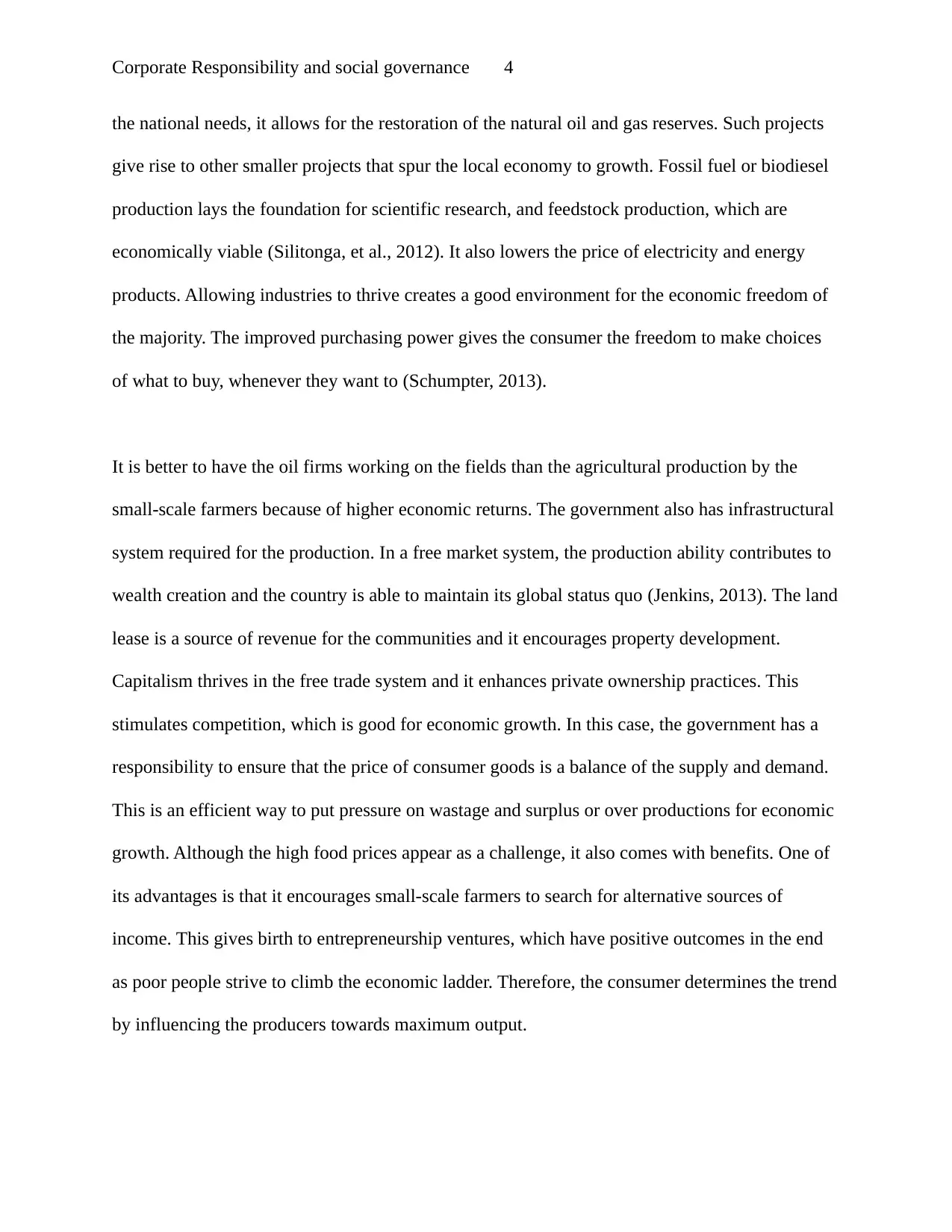
Corporate Responsibility and social governance 4
the national needs, it allows for the restoration of the natural oil and gas reserves. Such projects
give rise to other smaller projects that spur the local economy to growth. Fossil fuel or biodiesel
production lays the foundation for scientific research, and feedstock production, which are
economically viable (Silitonga, et al., 2012). It also lowers the price of electricity and energy
products. Allowing industries to thrive creates a good environment for the economic freedom of
the majority. The improved purchasing power gives the consumer the freedom to make choices
of what to buy, whenever they want to (Schumpter, 2013).
It is better to have the oil firms working on the fields than the agricultural production by the
small-scale farmers because of higher economic returns. The government also has infrastructural
system required for the production. In a free market system, the production ability contributes to
wealth creation and the country is able to maintain its global status quo (Jenkins, 2013). The land
lease is a source of revenue for the communities and it encourages property development.
Capitalism thrives in the free trade system and it enhances private ownership practices. This
stimulates competition, which is good for economic growth. In this case, the government has a
responsibility to ensure that the price of consumer goods is a balance of the supply and demand.
This is an efficient way to put pressure on wastage and surplus or over productions for economic
growth. Although the high food prices appear as a challenge, it also comes with benefits. One of
its advantages is that it encourages small-scale farmers to search for alternative sources of
income. This gives birth to entrepreneurship ventures, which have positive outcomes in the end
as poor people strive to climb the economic ladder. Therefore, the consumer determines the trend
by influencing the producers towards maximum output.
the national needs, it allows for the restoration of the natural oil and gas reserves. Such projects
give rise to other smaller projects that spur the local economy to growth. Fossil fuel or biodiesel
production lays the foundation for scientific research, and feedstock production, which are
economically viable (Silitonga, et al., 2012). It also lowers the price of electricity and energy
products. Allowing industries to thrive creates a good environment for the economic freedom of
the majority. The improved purchasing power gives the consumer the freedom to make choices
of what to buy, whenever they want to (Schumpter, 2013).
It is better to have the oil firms working on the fields than the agricultural production by the
small-scale farmers because of higher economic returns. The government also has infrastructural
system required for the production. In a free market system, the production ability contributes to
wealth creation and the country is able to maintain its global status quo (Jenkins, 2013). The land
lease is a source of revenue for the communities and it encourages property development.
Capitalism thrives in the free trade system and it enhances private ownership practices. This
stimulates competition, which is good for economic growth. In this case, the government has a
responsibility to ensure that the price of consumer goods is a balance of the supply and demand.
This is an efficient way to put pressure on wastage and surplus or over productions for economic
growth. Although the high food prices appear as a challenge, it also comes with benefits. One of
its advantages is that it encourages small-scale farmers to search for alternative sources of
income. This gives birth to entrepreneurship ventures, which have positive outcomes in the end
as poor people strive to climb the economic ladder. Therefore, the consumer determines the trend
by influencing the producers towards maximum output.
Paraphrase This Document
Need a fresh take? Get an instant paraphrase of this document with our AI Paraphraser
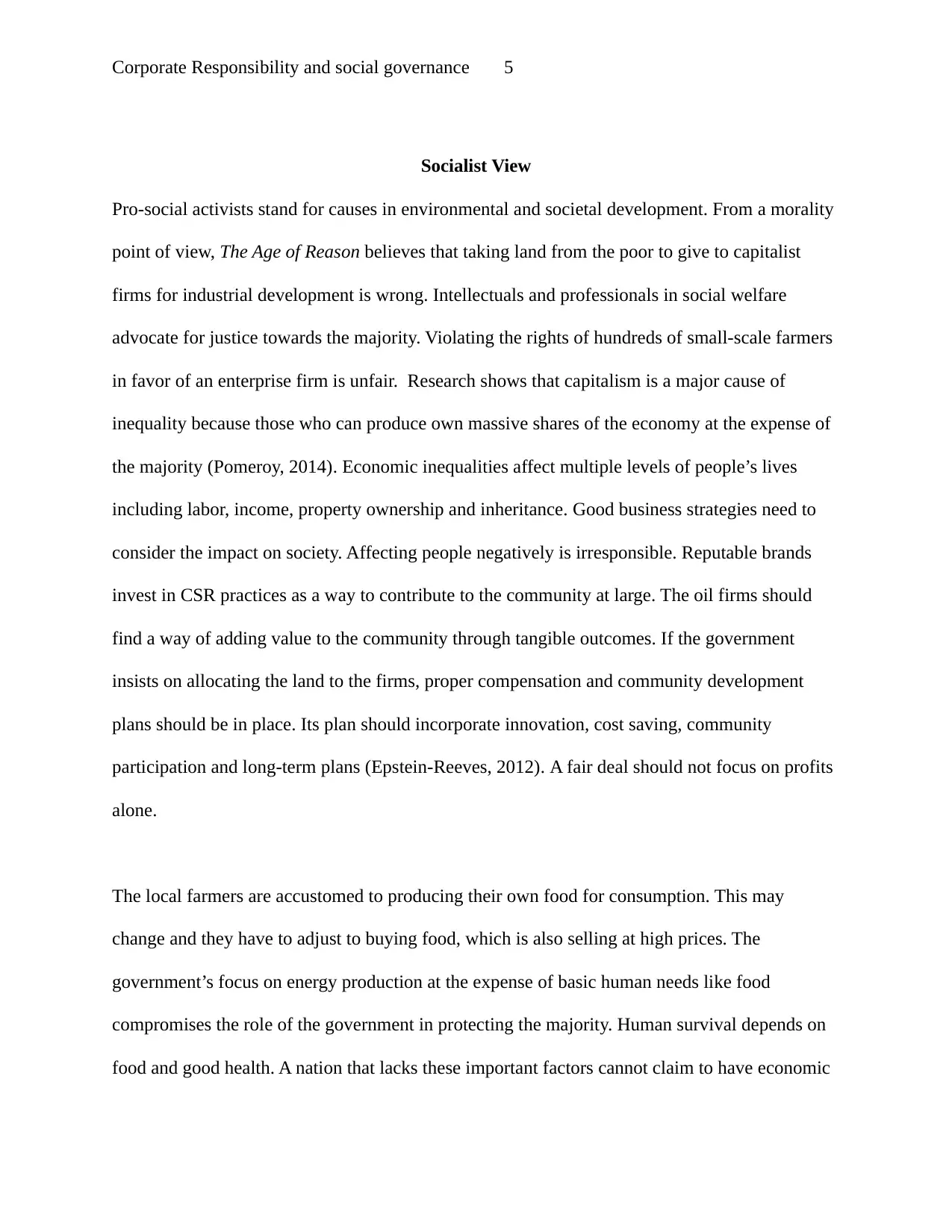
Corporate Responsibility and social governance 5
Socialist View
Pro-social activists stand for causes in environmental and societal development. From a morality
point of view, The Age of Reason believes that taking land from the poor to give to capitalist
firms for industrial development is wrong. Intellectuals and professionals in social welfare
advocate for justice towards the majority. Violating the rights of hundreds of small-scale farmers
in favor of an enterprise firm is unfair. Research shows that capitalism is a major cause of
inequality because those who can produce own massive shares of the economy at the expense of
the majority (Pomeroy, 2014). Economic inequalities affect multiple levels of people’s lives
including labor, income, property ownership and inheritance. Good business strategies need to
consider the impact on society. Affecting people negatively is irresponsible. Reputable brands
invest in CSR practices as a way to contribute to the community at large. The oil firms should
find a way of adding value to the community through tangible outcomes. If the government
insists on allocating the land to the firms, proper compensation and community development
plans should be in place. Its plan should incorporate innovation, cost saving, community
participation and long-term plans (Epstein-Reeves, 2012). A fair deal should not focus on profits
alone.
The local farmers are accustomed to producing their own food for consumption. This may
change and they have to adjust to buying food, which is also selling at high prices. The
government’s focus on energy production at the expense of basic human needs like food
compromises the role of the government in protecting the majority. Human survival depends on
food and good health. A nation that lacks these important factors cannot claim to have economic
Socialist View
Pro-social activists stand for causes in environmental and societal development. From a morality
point of view, The Age of Reason believes that taking land from the poor to give to capitalist
firms for industrial development is wrong. Intellectuals and professionals in social welfare
advocate for justice towards the majority. Violating the rights of hundreds of small-scale farmers
in favor of an enterprise firm is unfair. Research shows that capitalism is a major cause of
inequality because those who can produce own massive shares of the economy at the expense of
the majority (Pomeroy, 2014). Economic inequalities affect multiple levels of people’s lives
including labor, income, property ownership and inheritance. Good business strategies need to
consider the impact on society. Affecting people negatively is irresponsible. Reputable brands
invest in CSR practices as a way to contribute to the community at large. The oil firms should
find a way of adding value to the community through tangible outcomes. If the government
insists on allocating the land to the firms, proper compensation and community development
plans should be in place. Its plan should incorporate innovation, cost saving, community
participation and long-term plans (Epstein-Reeves, 2012). A fair deal should not focus on profits
alone.
The local farmers are accustomed to producing their own food for consumption. This may
change and they have to adjust to buying food, which is also selling at high prices. The
government’s focus on energy production at the expense of basic human needs like food
compromises the role of the government in protecting the majority. Human survival depends on
food and good health. A nation that lacks these important factors cannot claim to have economic
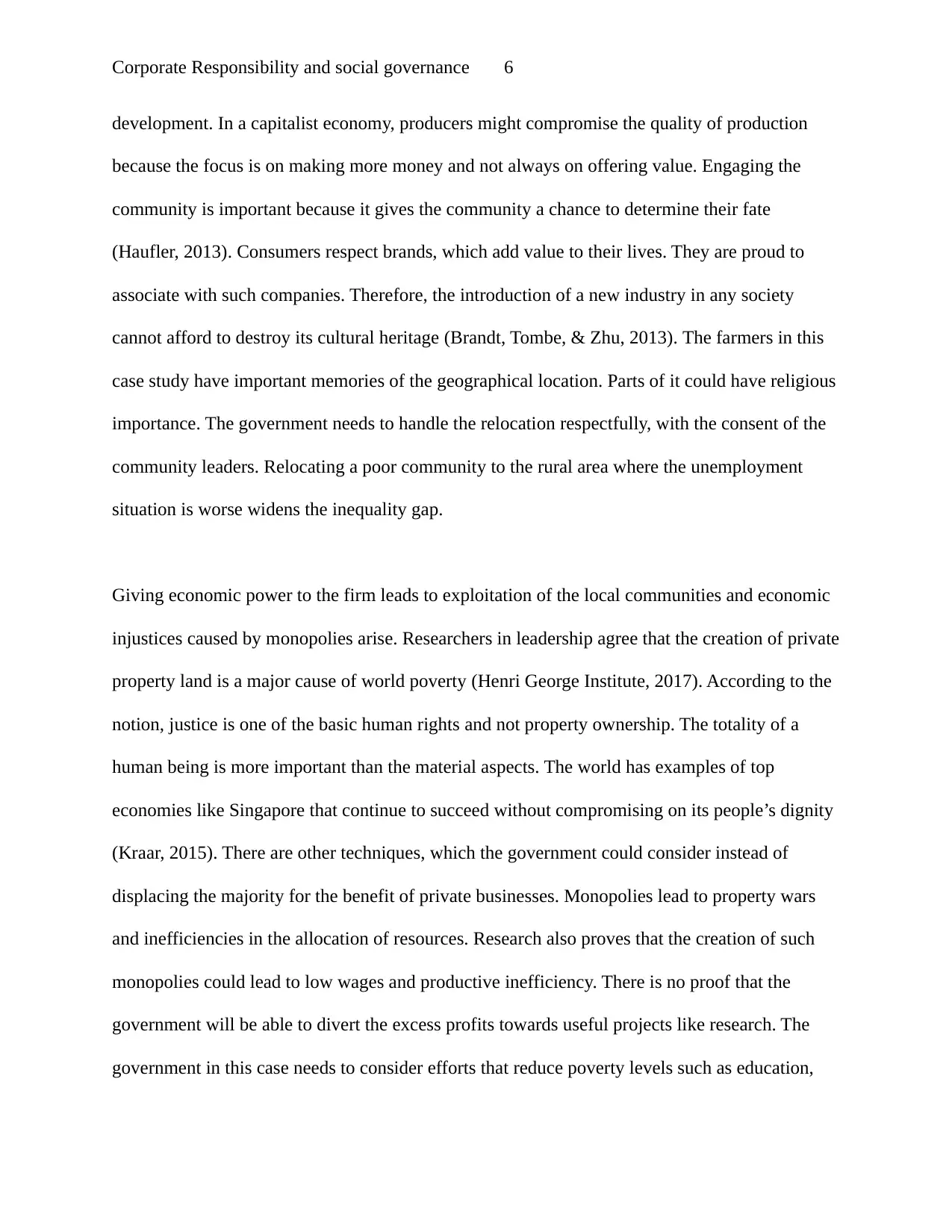
Corporate Responsibility and social governance 6
development. In a capitalist economy, producers might compromise the quality of production
because the focus is on making more money and not always on offering value. Engaging the
community is important because it gives the community a chance to determine their fate
(Haufler, 2013). Consumers respect brands, which add value to their lives. They are proud to
associate with such companies. Therefore, the introduction of a new industry in any society
cannot afford to destroy its cultural heritage (Brandt, Tombe, & Zhu, 2013). The farmers in this
case study have important memories of the geographical location. Parts of it could have religious
importance. The government needs to handle the relocation respectfully, with the consent of the
community leaders. Relocating a poor community to the rural area where the unemployment
situation is worse widens the inequality gap.
Giving economic power to the firm leads to exploitation of the local communities and economic
injustices caused by monopolies arise. Researchers in leadership agree that the creation of private
property land is a major cause of world poverty (Henri George Institute, 2017). According to the
notion, justice is one of the basic human rights and not property ownership. The totality of a
human being is more important than the material aspects. The world has examples of top
economies like Singapore that continue to succeed without compromising on its people’s dignity
(Kraar, 2015). There are other techniques, which the government could consider instead of
displacing the majority for the benefit of private businesses. Monopolies lead to property wars
and inefficiencies in the allocation of resources. Research also proves that the creation of such
monopolies could lead to low wages and productive inefficiency. There is no proof that the
government will be able to divert the excess profits towards useful projects like research. The
government in this case needs to consider efforts that reduce poverty levels such as education,
development. In a capitalist economy, producers might compromise the quality of production
because the focus is on making more money and not always on offering value. Engaging the
community is important because it gives the community a chance to determine their fate
(Haufler, 2013). Consumers respect brands, which add value to their lives. They are proud to
associate with such companies. Therefore, the introduction of a new industry in any society
cannot afford to destroy its cultural heritage (Brandt, Tombe, & Zhu, 2013). The farmers in this
case study have important memories of the geographical location. Parts of it could have religious
importance. The government needs to handle the relocation respectfully, with the consent of the
community leaders. Relocating a poor community to the rural area where the unemployment
situation is worse widens the inequality gap.
Giving economic power to the firm leads to exploitation of the local communities and economic
injustices caused by monopolies arise. Researchers in leadership agree that the creation of private
property land is a major cause of world poverty (Henri George Institute, 2017). According to the
notion, justice is one of the basic human rights and not property ownership. The totality of a
human being is more important than the material aspects. The world has examples of top
economies like Singapore that continue to succeed without compromising on its people’s dignity
(Kraar, 2015). There are other techniques, which the government could consider instead of
displacing the majority for the benefit of private businesses. Monopolies lead to property wars
and inefficiencies in the allocation of resources. Research also proves that the creation of such
monopolies could lead to low wages and productive inefficiency. There is no proof that the
government will be able to divert the excess profits towards useful projects like research. The
government in this case needs to consider efforts that reduce poverty levels such as education,
⊘ This is a preview!⊘
Do you want full access?
Subscribe today to unlock all pages.

Trusted by 1+ million students worldwide
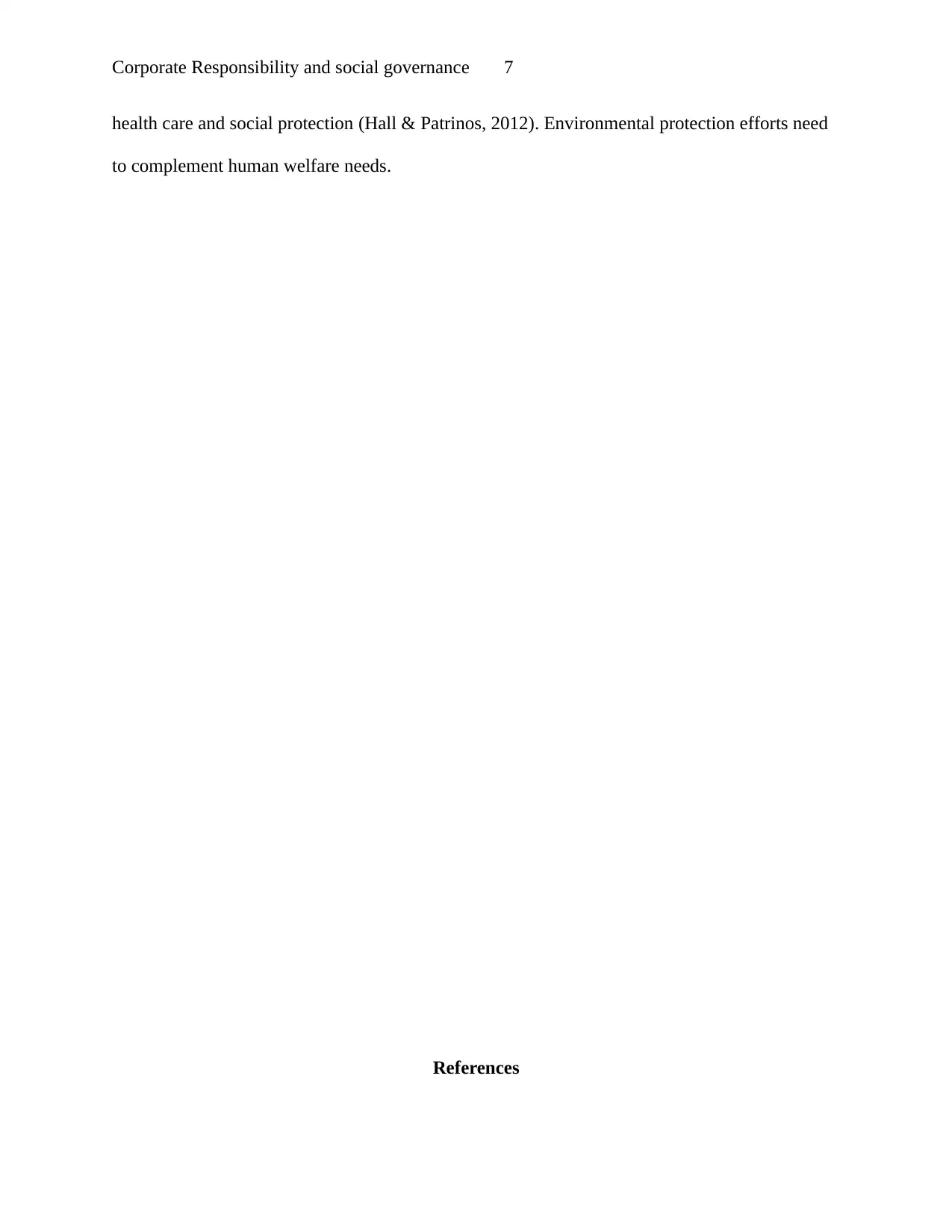
Corporate Responsibility and social governance 7
health care and social protection (Hall & Patrinos, 2012). Environmental protection efforts need
to complement human welfare needs.
References
health care and social protection (Hall & Patrinos, 2012). Environmental protection efforts need
to complement human welfare needs.
References
Paraphrase This Document
Need a fresh take? Get an instant paraphrase of this document with our AI Paraphraser
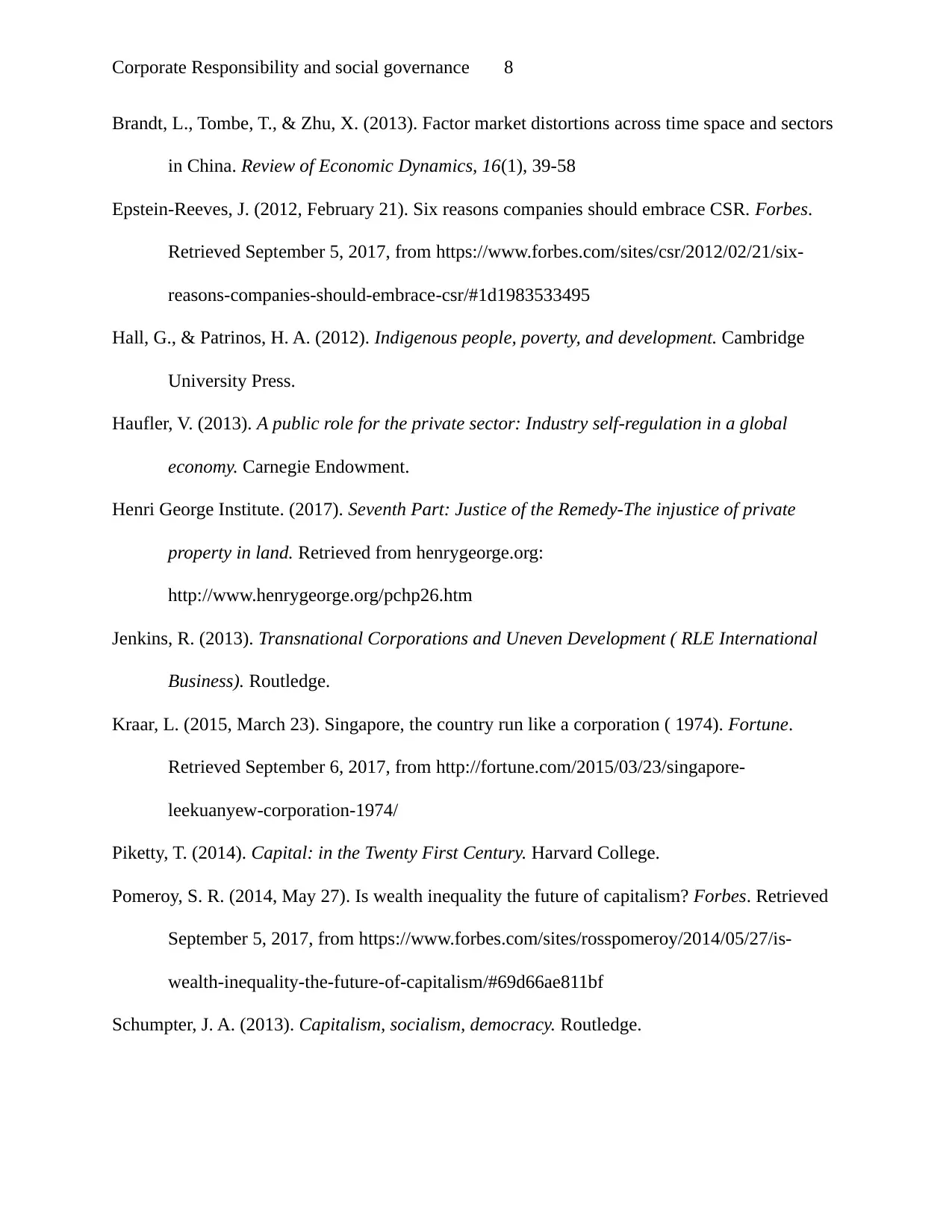
Corporate Responsibility and social governance 8
Brandt, L., Tombe, T., & Zhu, X. (2013). Factor market distortions across time space and sectors
in China. Review of Economic Dynamics, 16(1), 39-58
Epstein-Reeves, J. (2012, February 21). Six reasons companies should embrace CSR. Forbes.
Retrieved September 5, 2017, from https://www.forbes.com/sites/csr/2012/02/21/six-
reasons-companies-should-embrace-csr/#1d1983533495
Hall, G., & Patrinos, H. A. (2012). Indigenous people, poverty, and development. Cambridge
University Press.
Haufler, V. (2013). A public role for the private sector: Industry self-regulation in a global
economy. Carnegie Endowment.
Henri George Institute. (2017). Seventh Part: Justice of the Remedy-The injustice of private
property in land. Retrieved from henrygeorge.org:
http://www.henrygeorge.org/pchp26.htm
Jenkins, R. (2013). Transnational Corporations and Uneven Development ( RLE International
Business). Routledge.
Kraar, L. (2015, March 23). Singapore, the country run like a corporation ( 1974). Fortune.
Retrieved September 6, 2017, from http://fortune.com/2015/03/23/singapore-
leekuanyew-corporation-1974/
Piketty, T. (2014). Capital: in the Twenty First Century. Harvard College.
Pomeroy, S. R. (2014, May 27). Is wealth inequality the future of capitalism? Forbes. Retrieved
September 5, 2017, from https://www.forbes.com/sites/rosspomeroy/2014/05/27/is-
wealth-inequality-the-future-of-capitalism/#69d66ae811bf
Schumpter, J. A. (2013). Capitalism, socialism, democracy. Routledge.
Brandt, L., Tombe, T., & Zhu, X. (2013). Factor market distortions across time space and sectors
in China. Review of Economic Dynamics, 16(1), 39-58
Epstein-Reeves, J. (2012, February 21). Six reasons companies should embrace CSR. Forbes.
Retrieved September 5, 2017, from https://www.forbes.com/sites/csr/2012/02/21/six-
reasons-companies-should-embrace-csr/#1d1983533495
Hall, G., & Patrinos, H. A. (2012). Indigenous people, poverty, and development. Cambridge
University Press.
Haufler, V. (2013). A public role for the private sector: Industry self-regulation in a global
economy. Carnegie Endowment.
Henri George Institute. (2017). Seventh Part: Justice of the Remedy-The injustice of private
property in land. Retrieved from henrygeorge.org:
http://www.henrygeorge.org/pchp26.htm
Jenkins, R. (2013). Transnational Corporations and Uneven Development ( RLE International
Business). Routledge.
Kraar, L. (2015, March 23). Singapore, the country run like a corporation ( 1974). Fortune.
Retrieved September 6, 2017, from http://fortune.com/2015/03/23/singapore-
leekuanyew-corporation-1974/
Piketty, T. (2014). Capital: in the Twenty First Century. Harvard College.
Pomeroy, S. R. (2014, May 27). Is wealth inequality the future of capitalism? Forbes. Retrieved
September 5, 2017, from https://www.forbes.com/sites/rosspomeroy/2014/05/27/is-
wealth-inequality-the-future-of-capitalism/#69d66ae811bf
Schumpter, J. A. (2013). Capitalism, socialism, democracy. Routledge.
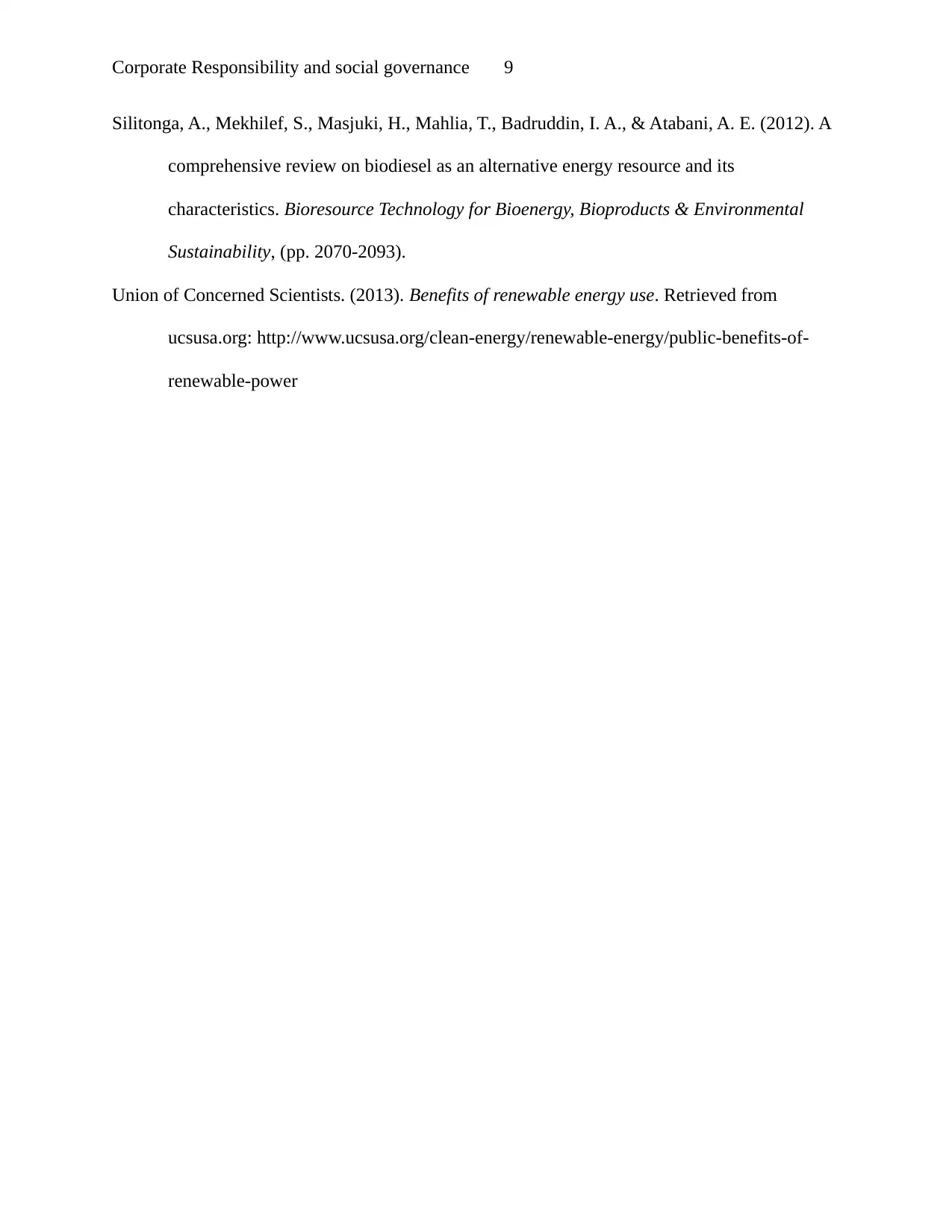
Corporate Responsibility and social governance 9
Silitonga, A., Mekhilef, S., Masjuki, H., Mahlia, T., Badruddin, I. A., & Atabani, A. E. (2012). A
comprehensive review on biodiesel as an alternative energy resource and its
characteristics. Bioresource Technology for Bioenergy, Bioproducts & Environmental
Sustainability, (pp. 2070-2093).
Union of Concerned Scientists. (2013). Benefits of renewable energy use. Retrieved from
ucsusa.org: http://www.ucsusa.org/clean-energy/renewable-energy/public-benefits-of-
renewable-power
Silitonga, A., Mekhilef, S., Masjuki, H., Mahlia, T., Badruddin, I. A., & Atabani, A. E. (2012). A
comprehensive review on biodiesel as an alternative energy resource and its
characteristics. Bioresource Technology for Bioenergy, Bioproducts & Environmental
Sustainability, (pp. 2070-2093).
Union of Concerned Scientists. (2013). Benefits of renewable energy use. Retrieved from
ucsusa.org: http://www.ucsusa.org/clean-energy/renewable-energy/public-benefits-of-
renewable-power
⊘ This is a preview!⊘
Do you want full access?
Subscribe today to unlock all pages.

Trusted by 1+ million students worldwide
1 out of 9
Related Documents
Your All-in-One AI-Powered Toolkit for Academic Success.
+13062052269
info@desklib.com
Available 24*7 on WhatsApp / Email
![[object Object]](/_next/static/media/star-bottom.7253800d.svg)
Unlock your academic potential
Copyright © 2020–2026 A2Z Services. All Rights Reserved. Developed and managed by ZUCOL.





